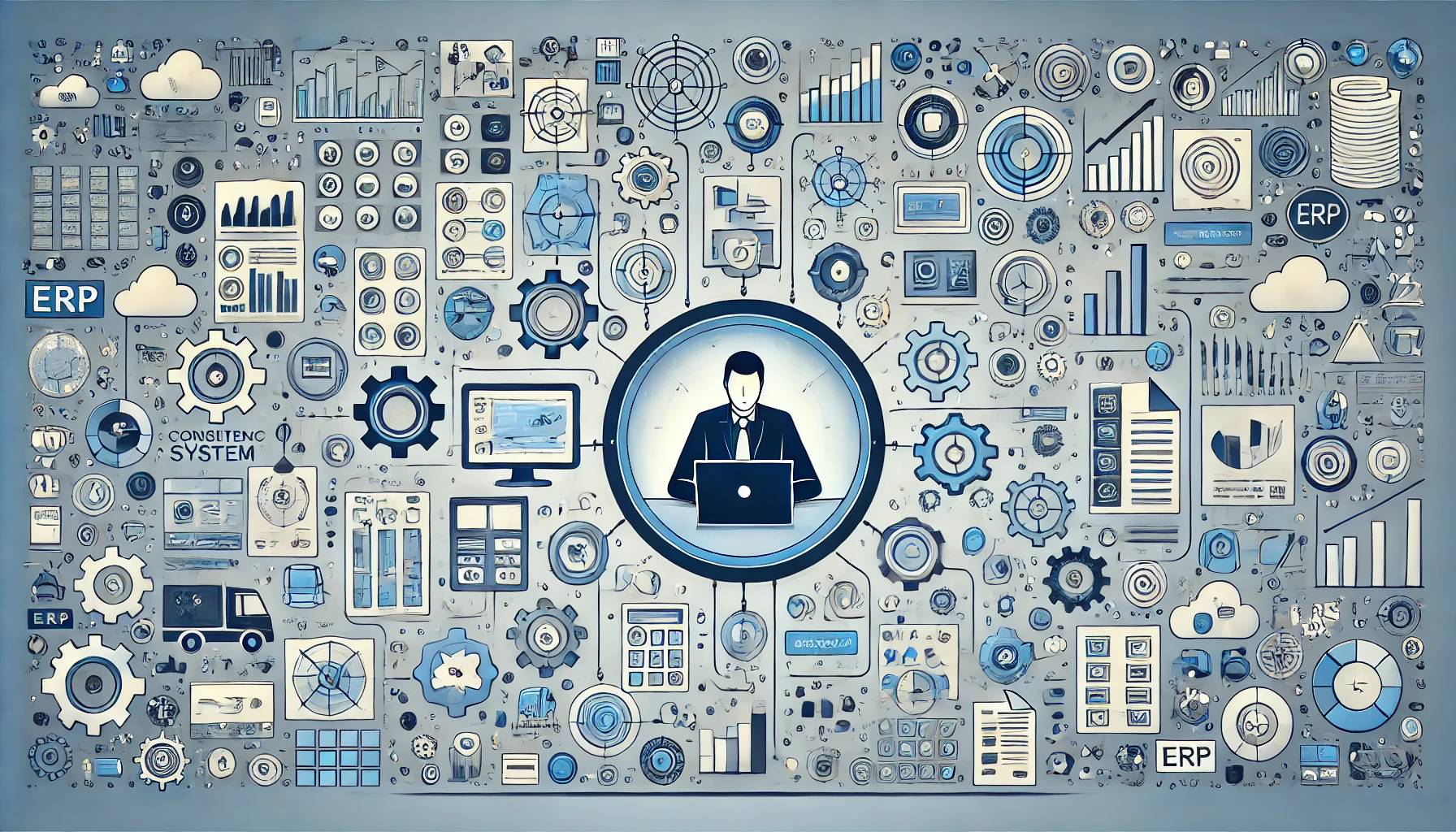↑
What is an ERP System?
Imagine having all the critical aspects of your business gathered in one place, working smoothly and effortlessly. With an ERP system (Enterprise Resource Planning), this is a reality. An ERP system is an integrated platform designed to unify business processes and functions into a single, centralized system. It provides a unified information environment where all data is always at your fingertips, enabling informed managerial decisions and boosting your business's productivity.
Let's delve into what an ERP system is, the different types available, and the benefits of implementing it.
Brief history of ERP systems
The history of ERP systems began with the concept of Material Requirements Planning (MRP) in the 1960s. MRP systems were designed to manage manufacturing processes and inventory.
In the 1980s, MRP evolved into MRP II (Manufacturing Resource Planning), which included not just production but also other business functions like finance and HR.
By the early 1990s, these systems had evolved into modern ERP systems—comprehensive platforms that integrate all aspects of a business. Today, ERP systems are an essential part of successful business operations.
An ERP system is an enterprise resource planning system that integrates all the main business processes of a company into a single platform. It is a powerful tool that automates and optimizes the company's operations, from finance and accounting to production and sales.

How does ERP work?
This system works like the brain of your business. After all, when you implement it, all your data - from finance to supply - is stored in a single centralized database. This allows all departments of the company to have access to up-to-date information in real time.
When the need arises, for example, to purchase new materials, ERP automatically updates information in all related modules - financial, production, and warehouse. This allows you to make quick decisions and optimize resources, increasing the overall efficiency of your business.
Key Modules Offered by ERP Systems
ERP systems offer various modules that can be implemented gradually, choosing those most necessary for your business at its current stage of development.
Main modules include:
- Finance: Automates accounting, expense management, and financial planning.
- Human Resources: Manages employee data, payroll, and recruitment.
- Procurement: Streamlines supplier selection and purchasing processes.
- Sales: Tracks orders and manages customer data.
- Manufacturing: Plans and controls production processes, ensuring efficient use of resources.
- Inventory Management: Manages stock levels, ensuring accurate tracking and storage of products.
- Logistics and Supply Chain Management: Optimizes the flow of goods from suppliers to customers.
- Customer Relationship Management (CRM): Manages customer interactions, sales, and marketing efforts.
The ERP-CRM system offered by LBS Cloud includes all necessary modules for enterprise resource planning and 50+ integrations to make your business more efficient.
ERP system types
ERP systems can be classified into several main types, each with its own advantages depending on the needs of your business:
· On-premises, which are installed on the company's own servers, providing full control over the data, and cloud-based, which run on the provider's servers, providing easy access from anywhere and reducing IT infrastructure costs. The LBS Cloud ERP system is of this type.
· Open-source, allowing users to customize and modify the system to meet their needs, and closed-source, which provides more stable solutions from the provider.
· Universal, suitable for any business, and industry-specific, specially designed to meet the needs of specific sectors such as manufacturing, retail, healthcare, and more.

Benefits of ERP implementation for business
Implementing an ERP system in your business means enhancing efficiency and organization. Instead of spending time on routine tasks, you can focus on what matters most—developing your business and achieving your goals!
Benefits of implementation for ERP business
· data integrity;
· process automation;
· improved management;
· increase productivity;
· scalability.
Which Departments Can Be Optimized with ERP?
Implementing an ERP system can significantly improve the efficiency of the finance department through automated accounting and financial analysis, optimize procurement and inventory management processes, enhance production planning and quality control, increase the accuracy of sales forecasting and customer service management, and boost the efficiency of logistics processes and human resource management.
4 Signs That You Need an ERP System
1. Integration Issues with Different Systems: When you have several separate programs for different departments that do not interact well with each other, ERP can provide a unified integrated platform.
2. Reporting and Analytics Difficulties: When preparing reports takes a lot of time, and it's hard to consolidate data from different departments, an ERP system can automate this process, providing tools for quickly creating comprehensive reports and analytics.
3. Inefficient Inventory Management: If you are facing issues with excess or shortage of goods in the warehouse, ERP can optimize this process.
4. Problems with Business Process Control: If you feel like you are losing control over certain aspects of the business due to a lack of transparency and timely information, ERP can help improve monitoring and management of all processes.
If these signs sound familiar to you, it might be time to consider implementing an ERP system!
Conclusion
An ERP system is not just a tool, but a strategic solution for optimization and growth!
Are you ready to make your business more efficient and organized? We invite you to a consultation—discover the possibilities of the LBS Cloud ERP system and take the first step toward success!